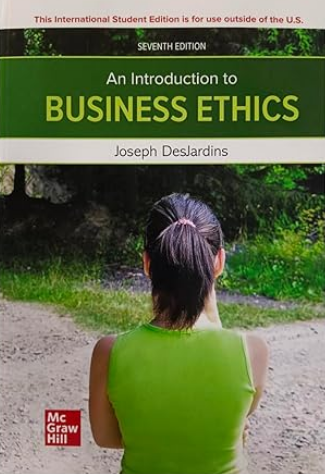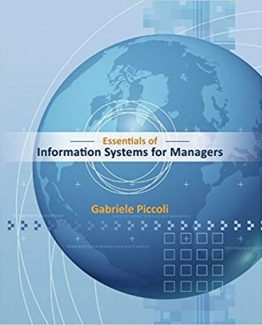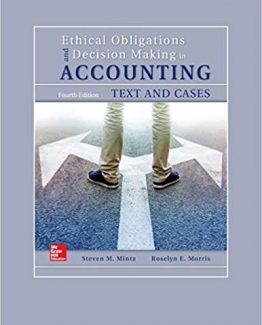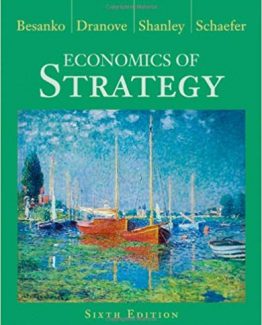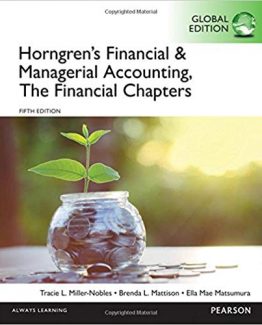An Introduction to Business Ethics 7th INTERNATIONAL Edition by Joseph R. DesJardins, ISBN-13: 978-1266198120
[PDF eBook eTextbook]
- Publisher: Mcgraw Hill; 7th Edition (ISE) (January 1, 2023)
- Language: English
- 320 pages
- ISBN-10: 1266198121
- ISBN-13: 978-1266198120
Since its inception, An Introduction to Business Ethics by Joseph DesJardins has been a cutting-edge resource for the business ethics course. DesJardins’ unique multidisciplinary approach offers critical analysis and integrates the perspective of philosophy with management, law, economics, and public policy, providing a clear, concise, yet reasonably comprehensive introductory survey of the ethical choices available to us in business.
Students are encouraged to think critically about issues from the perspectives of employee, customer, and citizen, as well as from the perspectives of business manager or executive.
Table of Contents:
Table of Contents and Preface
Cover Page
Title Page
Copyright Page
About the Author
Dedication
Contents
Preface to the Seventh Edition
Connect
Chapter 1: Why Study Ethics?
Chapter 1 Introduction
DISCUSSION CASE: Facebook
1.1 Business Ethics: The What and the Why
1.2 Ethics, Morality, and Social justice
1.3 Business Ethics as Responsible Decision Making
1.4 Skeptical Challenge I: isn’t the law enough?
1.5 Skeptical Challenge ii: Ethical relativism
1.6 A Model for Ethical Decision Making
Reflections on the Chapter Discussion Case
Chapter Review Questions
Endnote
Chapter 2: Ethical Theory and Business
Chapter 2 Introduction
DISCUSSION CASE: CEO Compensation versus Minimum Wage
2.1 Introduction
2.2 Virtue Ethics
2.3 Utilitarian Ethics
2.4 Challenges to Utilitarianism
Problems Raised from within the Utilitarian Tradition
Problems Raised to the Utilitarian Tradition
2.5 Utilitarianism and Business Policy
2.6 Rights, duties, and Principle-Based Ethics
2.7 Summary and Review
Reflections on the Chapter Discussion Case
Chapter Review Questions
Endnotes
Chapter 3: Corporate Social Responsibility
Chapter 3 Introduction
DISCUSSION CASE: Section 230: If it is Legal, Is It Ethically Responsible?
3.1 Introduction
3.2 The Economic Model of Corporate Social Responsibility
3.3 Critical Assessment of the Economic Model: The Utilitarian Defense
3.4 Critical Assessment of the Economic Model: The Private Property Defense
3.5 Modified Version of the Economic Model: The Moral Minimum
3.6 The Stakeholder Model of Corporate Social Responsibility
3.7 Strategic Model of Corporate Social Responsibility: Benefit Corporations
3.8 Summary and Review
Reflections on the Chapter Discussion Case
Chapter Review Questions
Endnotes
Chapter 4: Corporate Culture, Governance, and Ethical Leadership
Chapter 4 Introduction
DISCUSSION CASE: Fraud at Wells Fargo
4.1 Introduction
4.2 What is Corporate Culture?
4.3 Culture and Ethics
4.4 Ethical Leadership and Corporate Culture
4.5 Effective Leadership and Ethical Leadership
4.6 Building a Values-Based Corporate Culture
Mission Statements, Codes of Conduct, and Statements of Values
Ethics Hotlines, Ombudsmen, and Integrating Ethical Culture
Assessing and Monitoring the Corporate Culture: Audits
Reflections on the Chapter Discussion Case
Chapter Review Questions
Endnotes
Chapter 5: The Meaning and Value of Work
Chapter 5 Introduction
DISCUSSION CASE: Work–Life Balance After a Pandemic
5.1 Introduction
5.2 The Meanings of Work
5.3 The Value of Work
5.4 Conventional Views of Work
5.5 The Human Fulfillment Model
5.6 The Liberal Model of Work
5.7 Business’s Responsibility for Meaningful Work
Reflections on the Chapter Discussion Case
Chapter Review Questions
Endnotes
Chapter 6: Moral Rights in the Workplace
Chapter 6 Introduction
DISCUSSION CASE: Workplace Privacy and Employee Monitoring
6.1 Introduction: Employee Rights
6.2 The Right to Work
6.3 Employment at Will
6.4 Due Process in the Workplace
6.5 Participation Rights
6.6 Freedom of Expression
6.7 Employee Health and Safety
6.8 Privacy in the Workplace
Reflections on the Chapter Discussion Case
Chapter Review Questions
Endnotes
Chapter 7: Employee Responsibilities
Chapter 7 Introduction
DISCUSSION CASE: Trust in Business
7.1 Introduction
7.2 Trust And Business
7.3 The Narrow View of Employee Responsibilities: Employees as Agents
7.4 Professional Ethics and the Gatekeeper Function
7.5 Managerial Responsibility and Conflicts of Interest
7.6 Trust and Loyalty in the Workplace
7.7 Responsibilities to Third Parties: Honesty, Whistle-Blowing, and Insider Trading
Honesty
Whistle-Blowing
Insider Trading
Reflections on the Chapter Discussion Case
Chapter Review Questions
Endnotes
Chapter 8: Marketing Ethics: Product Safety and Pricing
Chapter 8 Introduction
DISCUSSION CASE: Social Harms: Obesity and Opioids
8.1 Ethical Issues in Marketing: An Overview
8.2 Ethical Responsibility for Products: From Caveat Emptor to Negligence
Caveat Emptor
Negligence
8.3 Strict Product Liability
8.4 Ethics and Pricing
Reflections on the Chapter Discussion Case
Chapter Review Questions
Endnotes
Chapter 9: Marketing Ethics: Advertising and Digital Marketing
Chapter 9 Introduction
DISCUSSION CASE: Digital Marketing and “Dark Patterns”
9.1 Introduction
9.2 Ethics of Manipulation and Deception
9.3 Governemnt Regulation of Deceptive and Unfair Advertising
9.4 Digital Marketing and Consumer Privacy
9.5 Marketing Ethics and Consumer Autonomy
9.6 Targeting the Vulnerable: Marketing and Sales
Reflections on the Chapter Discussion Case
Chapter Review Questions
Endnotes
Chapter 10: Sustainability and the Natural Environment
Chapter 10 Introduction
DISCUSSION CASE: Business and Sustainability
10.1 Introduction: Business, the Environment, and Sustainability
10.2 Corporate Social Responsibility and the Environment
10.3 Business’s Responsibility as Environmental Regulation
10.4 Business Ethics and Sustainable Economics
10.5 Business Ethics in the Age of Sustainable Development
10.6 The “Business Case” for Sustainability
10.7 Critical Reflections on Chapter Discussion Case
Chapter Review Questions
Endnotes
Chapter 11: Workplace Diversity and Discrimination
Chapter 11 Introduction
DISCUSSION CASE: Sexual Harassment and Gender Equality
11.1 Introduction: Diversity and Equality
11.2 Sexual Harassment in the Workplace
11.3 Discrimination, Equal Opportunity, and Affirmative Action
11.4 Preferential Treatment in Employment
11.5 Arguments Against Preferential Hiring
11.6 Arguments in Support of Preferential Hiring
Reflections on the Chapter Discussion Case
Chapter Review Questions
Endnotes
Chapter 12: International Business and Globalization
Chapter 12 Introduction
DISCUSSION CASE: Business Ethics in a Global Setting
12.1 Introduction
12.2 Ethical Relativism and Cross-Cultural Values
12.3 Cross-Cultural Values, Human Rights, and the Ruggie Principles
12.4 Globalization and International Business
12.5 Globalization and the Poor
12.6 “Race to the Bottom”
12.7 Democracy, Cultural Integrity, and Human Rights
12.8 International Business and a Duty of National Loyalty
Reflections on the Chapter Discussion Case
Chapter Review Questions
Endnotes
Index
Index
Accessibility Content: Text Alternatives for Images
A Page 1 Shows the Features Text Alternative (FM)
A Page 2 Shows the Features Text Alternative (FM)
Figure 10.1 Text Alternative (Chapter 10)
Figure 10.2 Text Alternative (Chapter 10)
Joseph DesJardins is professor emeritus at the College of St. Benedict and St. John’s University in Minnesota where he held the Ralph Gross Chair in Business and the Liberal Arts. His other books include An Introduction to Business Ethics; Environmental Ethics: An Introduction to Environmental Philosophy; Environmental Ethics: Concepts, Policy & Theory; Contemporary Issues in Business Ethics (coeditor with John McCall); and Business, Ethics, and the Environment: Imagining a Sustainable Future. He has served as president and executive director of the Society for Business Ethics and has published and lectured extensively in the areas of business ethics, environmental ethics, and sustainability. He received his BA from Southern Connecticut State University and his MA and PhD from the University of Notre Dame.
What makes us different?
• Instant Download
• Always Competitive Pricing
• 100% Privacy
• FREE Sample Available
• 24-7 LIVE Customer Support

